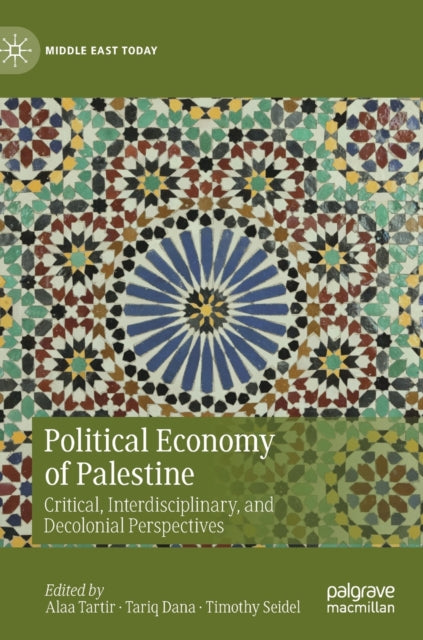Shulph Ink
Political Economy of Palestine: Critical, Interdisciplinary, and Decolonial Perspectives
Political Economy of Palestine: Critical, Interdisciplinary, and Decolonial Perspectives
YOU SAVE £23.38
- Condition: Brand new
- UK Delivery times: Usually arrives within 2 - 3 working days
- UK Shipping: Fee starts at £2.39. Subject to product weight & dimension
Bulk ordering. Want 15 or more copies? Get a personalised quote and bigger discounts. Learn more about bulk orders.
Couldn't load pickup availability
- More about Political Economy of Palestine: Critical, Interdisciplinary, and Decolonial Perspectives
This book examines the political economy of Palestine from critical, interdisciplinary, and decolonial perspectives, highlighting the need for a de-politicized economics to understand the situation in occupied Palestine. It explores how processes of accumulation by exploitation and dispossession shape the political economy, and how struggles against neoliberal and settler colonial policies and institutions are essential for de-fragmentation and development.
Format: Hardback
Length: 335 pages
Publication date: 19 May 2021
Publisher: Springer Nature Switzerland AG
This book delves into the intricate political economy of Palestine, employing a critical, interdisciplinary, and decolonial lens to shed light on the complex dynamics that shape the occupied territory. It emphasizes the inadequacy of a de-politicized economics approach, which fails to fully comprehend the political complexities of the situation in Palestine. By adopting a critical interdisciplinary approach, the book challenges prevailing neoliberal logics and structures that perpetuate racial capitalism, unveiling the ways in which the political economy of occupied Palestine is intricately shaped by processes of accumulation by exploitation and dispossession from both Israel and global business entities, as well as from Palestinian elites. Furthermore, a decolonial perspective is incorporated into the analysis, emphasizing the struggles against neoliberal and settler colonial policies and institutions that hinder the de-fragmentation of Palestinian life, land, and political economy. The chapters within this book provide a comprehensive contextualization of the Palestinian political economy, delving into the political economy of integration, fragmentation, and inequality. They also explore and problematize various sectors and themes of political economy in the absence of sovereignty, offering valuable insights into the challenges and opportunities faced by the Palestinian people.
Introduction:
The political economy of Palestine is a multifaceted and complex issue that requires a comprehensive and interdisciplinary approach. This book aims to explore the political economy of Palestine through critical, interdisciplinary, and decolonial perspectives, highlighting the need for a de-politicized economics approach that considers the political dimensions of the occupation.
Critical Interdisciplinary Approach:
A critical interdisciplinary approach to the political economy challenges prevailing neoliberal logics and structures that reproduce racial capitalism. It seeks to understand how the political economy of occupied Palestine is shaped by processes of accumulation by exploitation and dispossession from both Israel and global business entities, as well as from Palestinian elites. By examining the intersection of politics, economics, and culture, the book aims to provide a deeper understanding of the complex dynamics that underpin the situation in Palestine.
Decolonial Approach:
A decolonial approach to the Palestinian political economy foregrounds struggles against neoliberal and settler colonial policies and institutions. It recognizes the historical and ongoing marginalization and dispossession of the Palestinian people, and aims to dismantle the structures that perpetuate their subjugation. The decolonial approach emphasizes the importance of reclaiming Palestinian land, resources, and political sovereignty, and seeks to build a more inclusive and equitable society.
Chapters:
The book is organized into several chapters that cover different aspects of the Palestinian political economy. These chapters provide an in-depth contextualization of the political economy, analyze the political economy of integration, fragmentation, and inequality, and explore and problematize multiple sectors and themes of political economy in the absence of sovereignty.
Conclusion:
In conclusion, this book offers a valuable contribution to the study of the political economy of Palestine. By employing a critical, interdisciplinary, and decolonial lens, it challenges prevailing narratives and provides a nuanced understanding of the complex dynamics that shape the occupied territory. The book highlights the need for a comprehensive and decolonial approach to the political economy of Palestine, one that recognizes the historical and ongoing struggles of the Palestinian people and seeks to build a more just and equitable society.
Weight: 601g
Dimension: 210 x 148 (mm)
ISBN-13: 9783030686420
Edition number: 1st ed. 2021
This item can be found in:
UK and International shipping information
UK and International shipping information
UK Delivery and returns information:
- Delivery within 2 - 3 days when ordering in the UK.
- Shipping fee for UK customers from £2.39. Fully tracked shipping service available.
- Returns policy: Return within 30 days of receipt for full refund.
International deliveries:
Shulph Ink now ships to Australia, Belgium, Canada, France, Germany, Ireland, Italy, India, Luxembourg Saudi Arabia, Singapore, Spain, Netherlands, New Zealand, United Arab Emirates, United States of America.
- Delivery times: within 5 - 10 days for international orders.
- Shipping fee: charges vary for overseas orders. Only tracked services are available for most international orders. Some countries have untracked shipping options.
- Customs charges: If ordering to addresses outside the United Kingdom, you may or may not incur additional customs and duties fees during local delivery.


